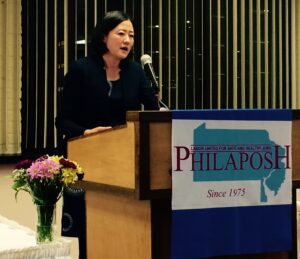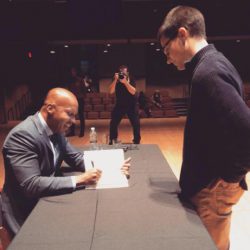Our first guest post comes from Tony Sierzega, a second-year student in the Sheller Center’s Social Justice Lawyering Clinic. Of course, guest posts reflect the personal views of the authors; we welcome a diversity of viewpoints.
Learning to be a Social Justice Lawyer in Trump’s America
Tony Sierzega
“No martyr is among ye now
Whom you can call your own
So go on your way accordingly
But know you’re not alone” – Bob Dylan, “I Dreamed I Saw St. Augustine”
During my first class after Donald Trump’s victory, several friends and classmates posed heartbreaking questions: How can we be social justice lawyers in a country which has validated a campaign where racist and misogynistic sentiments were expressed? Or after an election where many were so apathetic toward justice that they stayed home? We further questioned what the fight for social justice would even look like in the United States and how we, or anyone, could have the strength to do this work in a world where it no longer seemed to matter. So far, the only answer to these questions I have found has been in the strength and courage of the students in that classroom and in the wisdom and drive that I have found in my clinic partners and professors. At this moment, we feel scared and alone, but in time we will have the same realization as Dylan’s worried dreamer; that when we pursue social justice, we are not alone.
I chose to go to law school because I wanted to serve the most vulnerable, oppressed, and impoverished communities. The Sheller Center has provided all students with these feelings the opportunity to do good work early in our legal training. This semester, my clinic classmates and I have worked on a variety of issues, including advocating for the rights of migrant families and children detained at the Berks Family Detention Center and representing low-wage workers who have been denied their fair compensation. This work is not going to disappear in President Trump’s America, though it is going to get harder. As my classmates and professors in the Sheller Center have taught me, that just means we need to be braver.
A dear friend and Philadelphia community organizer posted a message on Facebook, asking, “what have I done today to make the people whose lives are most impacted by these conditions better . . . what have I done today to dismantle the conditions that make it difficult or impossible for the folks most effected by them to make their lives better for themselves?” I am proud that he is a friend who should not be ashamed of his answer. Further, I am fortunate that Temple and the Sheller Center have provided students with the opportunity to also not be ashamed of our answer. Tuesday demonstrated how much more work we have to do, but it should also provide the powerful inspiration needed to complete that work. Although we have new questions about what it means to be a social justice lawyer, at this moment, we at least have the Sheller Center to try and find an answer.
Following Trump’s election, the Social Justice Lawyering Clinic and Justice Lab held a joint class in which we discussed how our heroes would respond. First, I thought about Bryan Stevenson, the civil rights attorney and one of my inspirations for becoming a lawyer. In his memoir “Just Mercy,” Mr. Stevenson, following the execution of his client Jimmy Dill, asked himself, “Why am I doing this?” His response was, “we are bodies of broken bones . . . I do what I do because I’m broken too . . . You can’t effectively fight abusive power, poverty, inequality, illness, oppression, or injustice and not be broken by it . . . Our shared brokenness connects us.” The shared sadness, and seeing the tears and fear in a room full of strong future lawyers demonstrated that the election of Donald Trump has broken us all. The very real threat that it poses to the lives of our family, friends, neighbors, and selves is a source of collective brokenness that Mr. Stevenson believes ought to unite us as humans, not discourage us from committing to the hard work we have ahead. Being a social justice lawyer means seeing the humanity we share with our clients (and their oppressors) and seek healing. Like the resetting of a broken bone, this healing will hurt, but it is necessary to find the common humanity among us all that can lead to achieving justice.
Next, I considered the work of one of my favorite writers, James Baldwin. In his essay, “Nothing Personal,” Baldwin writes, “One discovers the light in darkness. That is what darkness is for. But everything in our lives depends on how we bear the light. It is necessary, while in darkness, to know that there is a light somewhere, to know that in oneself, waiting to be found there is a light. What the light reveals is danger, and what it demands is faith.” I see this light in the work of my fellow clinic students every day, and now fully realize the danger of bearing that light. But I also have faith that the work done in the Sheller Center will be done with Baldwin’s light in the face of America’s darkness. Baldwin concludes his essay, writing, “the sea rises, the light fails, lovers cling to each other, and children cling to us. And the moment we cease to hold each other, the moment we break faith with one another, the sea engulfs us and the light goes out.” Working with my partners this semester has convinced me of the truth that faith in each other keeps the light on and is necessary to be a social justice lawyer.
At the beginning of our joint class, students were encouraged to listen to Robert Kennedy’s speech following the assassination of Dr. Martin Luther King, Jr. I knew this was a good sign because in times of national tragedy, I have turned to the same speech and the poem Kennedy delivered written by the Greek poet, Aeschylus: “And even in our sleep pain that cannot forget/falls drop by drop upon the heart/until, in our own despair/against our will/comes wisdom to us/by the awful grace of God.” In these tragic times, I have found wisdom in my fellow Sheller Center students and professors; I only hope our nation can find it too. We still have a lot of difficult questions to consider when thinking about what it means to be a social justice lawyer, but at the very least, we must know that, because of our shared brokenness and despite the discouraging darkness, we are not alone.



 Fifty-nine organizations, including the Sheller Center for Social Justice, filed an
Fifty-nine organizations, including the Sheller Center for Social Justice, filed an